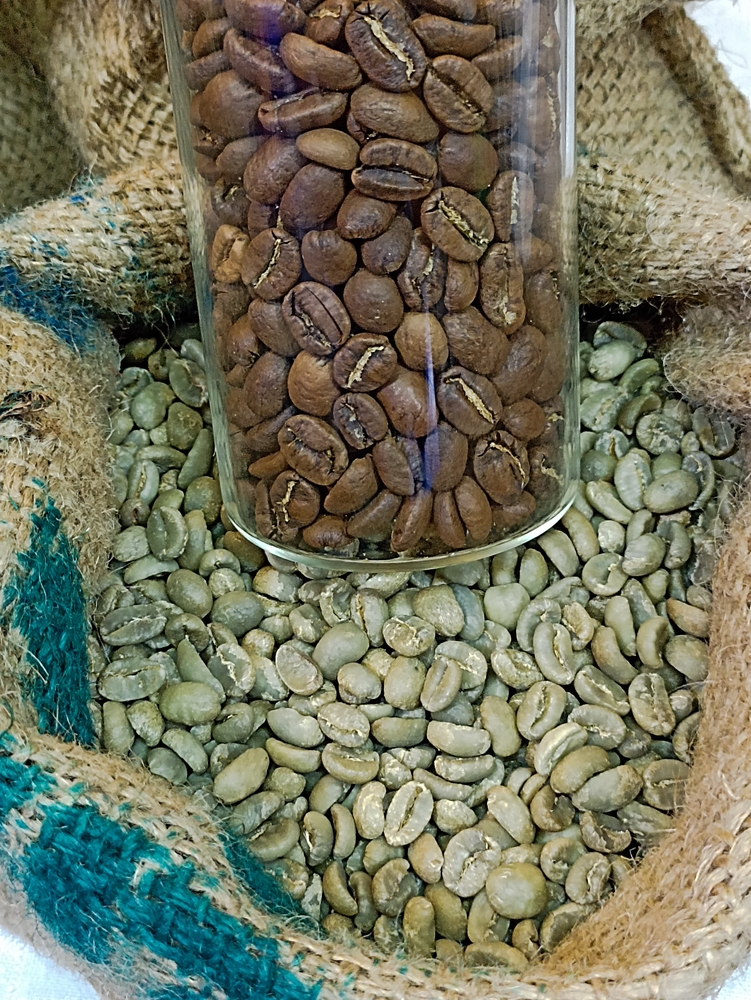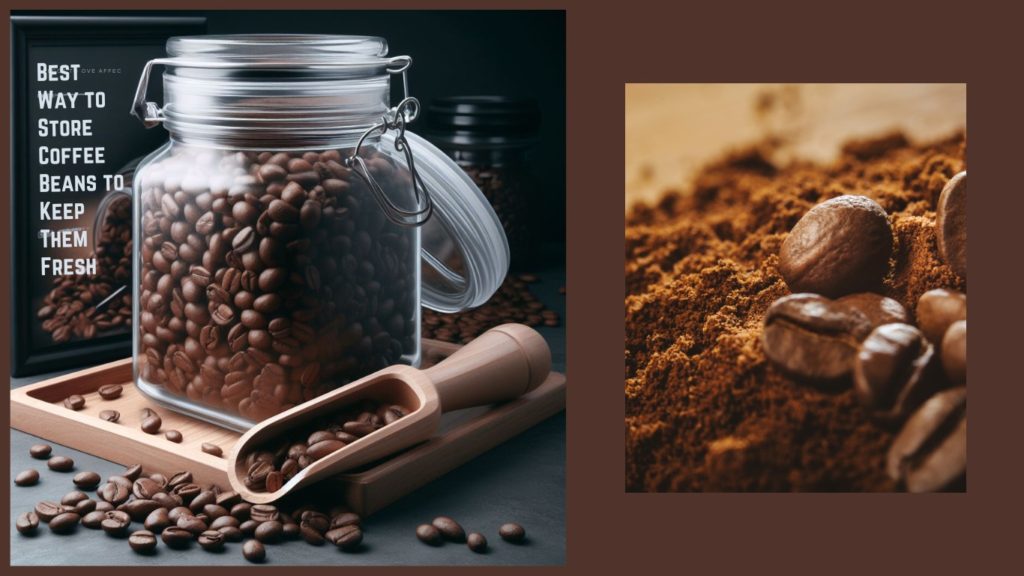Coffee is one of the most popular beverages in the world, and many people enjoy brewing their own coffee at home. But do you know how to store your coffee beans properly to preserve their freshness and flavor?
In this article, I will show you the 3 best ways to store coffee beans to keep them fresh and answer some common questions about coffee storage.
In this blog post we will look at the following:
Why and How to Keep Coffee Beans Fresh
Coffee beans are the seeds of the coffee plant, and they contain natural oils and compounds that give coffee its aroma and taste. When coffee beans are roasted, these oils and compounds are released and exposed to the air, which starts the process of oxidation.
Oxidation is the enemy of coffee freshness, as it causes the coffee beans to lose their flavor and aroma over time.
To keep your coffee beans fresh, you need to slow down the oxidation process as much as possible. The main factors that affect the oxidation rate of coffee beans are:
- Air: Oxygen in the air reacts with the coffee oils and compounds, making them stale and rancid. To prevent this, you need to store your coffee beans in an airtight container or bag, and squeeze out as much air as possible before sealing it.
- Light: Sunlight and artificial light can also degrade the coffee oils and compounds, and cause them to change color and flavor. To avoid this, you need to store your coffee beans in a dark place, away from direct light sources.
- Heat: High temperatures can speed up the oxidation process and make the coffee beans lose their freshness faster. To prevent this, you need to store your coffee beans in a cool place, preferably below 25°C (77°F).
- Moisture: Humidity and moisture can also affect the quality of coffee beans, as they can cause mold and bacteria growth, and alter the coffee flavor. To avoid this, you need to store your coffee beans in a dry place, away from sources of moisture such as sinks, dishwashers, or refrigerators.

Take the coffee personality quiz and get a personalized coffee recommendation
It does not matter if you buy the best beans but store them in the wrong way. Ex, let us say you some of the Best Coffee in Africa, but keep them open in the sun they will be spoiled pretty quickly.
But by following these simple guidelines, you can keep your coffee beans fresh for longer, and enjoy a better cup of coffee every time.
How Should You Store Coffee Beans
The 3 best way to store coffee beans is to use a container or a bag that is:
- Airtight: The container or bag should have a tight seal that prevents air from entering or escaping. This will reduce the exposure of the coffee beans to oxygen, which causes oxidation and staleness. Some examples of airtight containers are glass jars, metal cans, or plastic tubs with lids. Some examples of airtight bags are ziplock bags, vacuum-sealed bags, or valve bags. Valve bags are specially designed for coffee storage, as they have a one-way valve that allows carbon dioxide to escape, but prevents oxygen from entering.
- Opaque: The container or bag should be dark or opaque, so that light cannot penetrate it. This will protect the coffee beans from the harmful effects of light, which can degrade the coffee oils and compounds, and change the color and flavor of the coffee. Some examples of opaque containers are ceramic jars, tin cans, or dark glass jars. Some examples of opaque bags are foil bags, kraft paper bags, or black plastic bags.
- Dry: The container or bag should be dry and clean, so that moisture and dirt cannot contaminate the coffee beans. This will prevent the growth of mold and bacteria, and preserve the freshness and quality of the coffee. You should also avoid storing your coffee beans in places that are humid or wet, such as near sinks, dishwashers, or refrigerators.
Should I Use a Container to Store Coffee Beans
Using a container to store coffee beans is a good option, as long as the container meets the criteria of being airtight, opaque, and dry. A container can also offer some advantages over a bag, such as:
- Durability: A container is more durable and sturdy than a bag, and can withstand more wear and tear. A container can also protect the coffee beans from physical damage, such as crushing or spilling.
- Reusability: A container is more reusable and eco-friendly than a bag, and can reduce waste and environmental impact. A container can also save you money, as you can buy coffee beans in bulk and store them in the same container, instead of buying pre-packaged coffee bags.
- Aesthetics: A container can be more aesthetically pleasing and attractive than a bag, and can enhance the appearance and ambiance of your kitchen or coffee station. A container can also come in different shapes, sizes, colors, and designs, and you can choose one that suits your personal style and preference.
Storing Coffee Beans in Vacuum
Storing coffee beans in vacuum is another option, and it involves removing all the air from the container or bag before sealing it. This can create a near-perfect environment for coffee storage, as it eliminates the exposure of the coffee beans to oxygen, light, heat, and moisture. Storing coffee beans in vacuum can also extend the shelf life of the coffee beans, and preserve their freshness and flavor for longer.
However, storing coffee beans in vacuum also has some drawbacks, such as:
- Cost: Storing coffee beans in vacuum can be more expensive and complicated than storing them in a regular container or bag. You will need to buy a vacuum sealer machine and vacuum bags, which can be costly and take up space. You will also need to operate the machine and seal the bags, which can be time-consuming and inconvenient.
- Degassing: Storing coffee beans in vacuum can also interfere with the degassing process of the coffee beans. Degassing is the natural release of carbon dioxide from the roasted coffee beans, and it is essential for the development and stabilization of the coffee flavor. Degassing usually takes place within the first few days or weeks after roasting, depending on the roast level and the coffee variety.
If you store the coffee beans in vacuum too soon after roasting, you may prevent the degassing process from completing, and affect the taste and quality of the coffee. If you store the coffee beans in vacuum too late after roasting, you may lose some of the freshness and aroma of the coffee, as the degassing process also releases some of the volatile compounds that contribute to the coffee flavor.
Therefore, you need to find the optimal time to store the coffee beans in vacuum, which can vary depending on the coffee beans and your personal preference.
How Long Can You Store Coffee Beans
The shelf life of coffee beans depends on several factors, such as the roast level, the storage method, and the personal preference of the coffee drinker. In general, the fresher the coffee beans, the better the coffee taste.
However, some coffee beans may last longer than others, and some coffee drinkers may prefer older coffee beans over fresher ones. Therefore, there is no definitive answer to how long you can store coffee beans, but here are some approximate guidelines:

- Green coffee beans: Green coffee beans are the unroasted coffee beans, and they have the longest shelf life of all coffee beans. Green coffee beans can last for up to two years if stored properly in a cool, dry, and dark place. However, green coffee beans are not ready for brewing, and they need to be roasted before use.
- Roasted coffee beans: Roasted coffee beans are the coffee beans that have been exposed to high temperatures and transformed into the brown and aromatic beans that we know and love. Roasted coffee beans have a shorter shelf life than green coffee beans, as they start to lose their freshness and flavor after roasting. Roasted coffee beans can last for up to six months if stored properly in an airtight, opaque, and dry container or bag. However, most coffee experts and enthusiasts recommend using roasted coffee beans within one month of roasting, or even within two weeks for the best results.
- Ground coffee: Ground coffee is the coffee beans that have been ground into fine or coarse particles, depending on the brewing method. Ground coffee has the shortest shelf life of all coffee beans, as it has more surface area exposed to the air and other elements that cause oxidation and staleness. Ground coffee can last for up to one month if stored properly in an airtight, opaque, and dry container or bag. However, most coffee experts and enthusiasts recommend using ground coffee within one week of grinding, or even within one day for the best results.
As you can see, the shelf life of coffee beans decreases as they go through the stages of processing, from green to roasted to ground. Therefore, if you want to store your coffee beans for longer, you should buy them green and roast them yourself, or buy them roasted and grind them yourself.
This way, you can control the freshness and quality of your coffee beans, and enjoy a better cup of coffee every time.
Looking for the best way to brew your coffee beans? Read my Amaste Drip Coffee Maker Review.
Keep Coffee Grounds Fresh
If you prefer to buy ground coffee instead of whole coffee beans, or if you like to grind your coffee beans in advance and store them for later use, you may wonder how to keep your coffee grounds fresh. (I do not recommend this, I believe whole coffee beans are best to both drink and store. But I know pre-grounded coffee is more common.)
As I mentioned before, ground coffee has the shortest shelf life of all coffee beans, and it starts to lose its freshness and flavor as soon as it is ground. However, there are some tips and tricks that you can follow to keep your coffee grounds fresh for longer, such as:
If you like fresh and warm coffee, you should consider a smart mug. Read my SMRTMUGG Heated Coffee Mug Review.
- Grind only what you need: The best way to keep your coffee grounds fresh is to grind only the amount of coffee that you need for each brew, and use it immediately. This way, you can avoid exposing the coffee grounds to the air and other elements that cause oxidation and staleness, and preserve the freshness and flavor of the coffee. You can use a coffee grinder to grind your coffee beans on demand, or you can use a coffee scoop to measure the right amount of coffee grounds for each brew. Here is a coffee grind guide.
- Store in an airtight, opaque, and dry container or bag: If you have to store your coffee grounds for later use, you should store them in a container or a bag that is airtight, opaque, and dry, as we explained before. This will reduce the exposure of the coffee grounds to oxygen, light, heat, and moisture, and slow down the oxidation process. You should also label the container or bag with the date of grinding, so that you can keep track of the freshness and quality of the coffee grounds.
- Store in a cool place: You should also store your coffee grounds in a cool place, preferably below 25°C (77°F), as high temperatures can speed up the oxidation process and make the coffee grounds lose their freshness faster. You should avoid storing your coffee grounds in places that are hot or fluctuate in temperature, such as near stoves, ovens, microwaves, or windows.
- Do not freeze or refrigerate: You may think that freezing or refrigerating your coffee grounds can extend their shelf life, but this is not true. Freezing or refrigerating your coffee grounds can actually damage them, as they can absorb the moisture and odors from the freezer or refrigerator, and alter the coffee flavor. Freezing or refrigerating your coffee grounds can also cause condensation and frost, which can ruin the texture and quality of the coffee grounds. Therefore, you should avoid freezing or refrigerating your coffee grounds, and store them in a cool and dry place instead.
Hey, what about instant coffee and freshness? Well, read more on that in my “The History And Science Of Instant Coffee” article!
Conclusion – The Best Way to Store Coffee Beans
In conclusion, the best way to store coffee beans to keep them fresh is to use an airtight, opaque, and dry container or bag, and store it in a cool, dark, and dry place. You should also grind your coffee beans only when you need them, and use them as soon as possible.
By following my simple tips, you can enjoy a delicious cup of coffee every time, and avoid wasting your precious coffee beans.
FAQ
Can I Store Coffee Grounds in the Freezer?
No, you should not store coffee grounds in the freezer, as this can damage the coffee grounds and affect their flavor. Freezing coffee grounds can cause them to absorb moisture and odors from the freezer, and create condensation and frost on the coffee grounds. This can ruin the texture and quality of the coffee grounds, and make them stale and rancid. Therefore, you should avoid freezing coffee grounds, and store them in a cool and dry place instead.
Should I Store Coffee Beans in the Refrigerator?
No, you should not store coffee beans in the refrigerator, as this can also damage the coffee beans and affect their flavor. Refrigerating coffee beans can cause them to absorb moisture and odors from the refrigerator, and create condensation and frost on the coffee beans. This can also ruin the texture and quality of the coffee beans, and make them stale and rancid. Therefore, you should avoid refrigerating coffee beans, and store them in a cool and dry place instead.
How to Store Green Coffee Beans?
Green coffee beans are the unroasted coffee beans, and they have the longest shelf life of all coffee beans. You can store green coffee beans for up to two years if you store them properly in a cool, dry, and dark place. You should also use an airtight, opaque, and dry container or bag to store green coffee beans, and label it with the date of purchase. You should avoid storing green coffee beans in places that are hot, humid, or exposed to light, as this can affect the quality and freshness of the green coffee beans.

